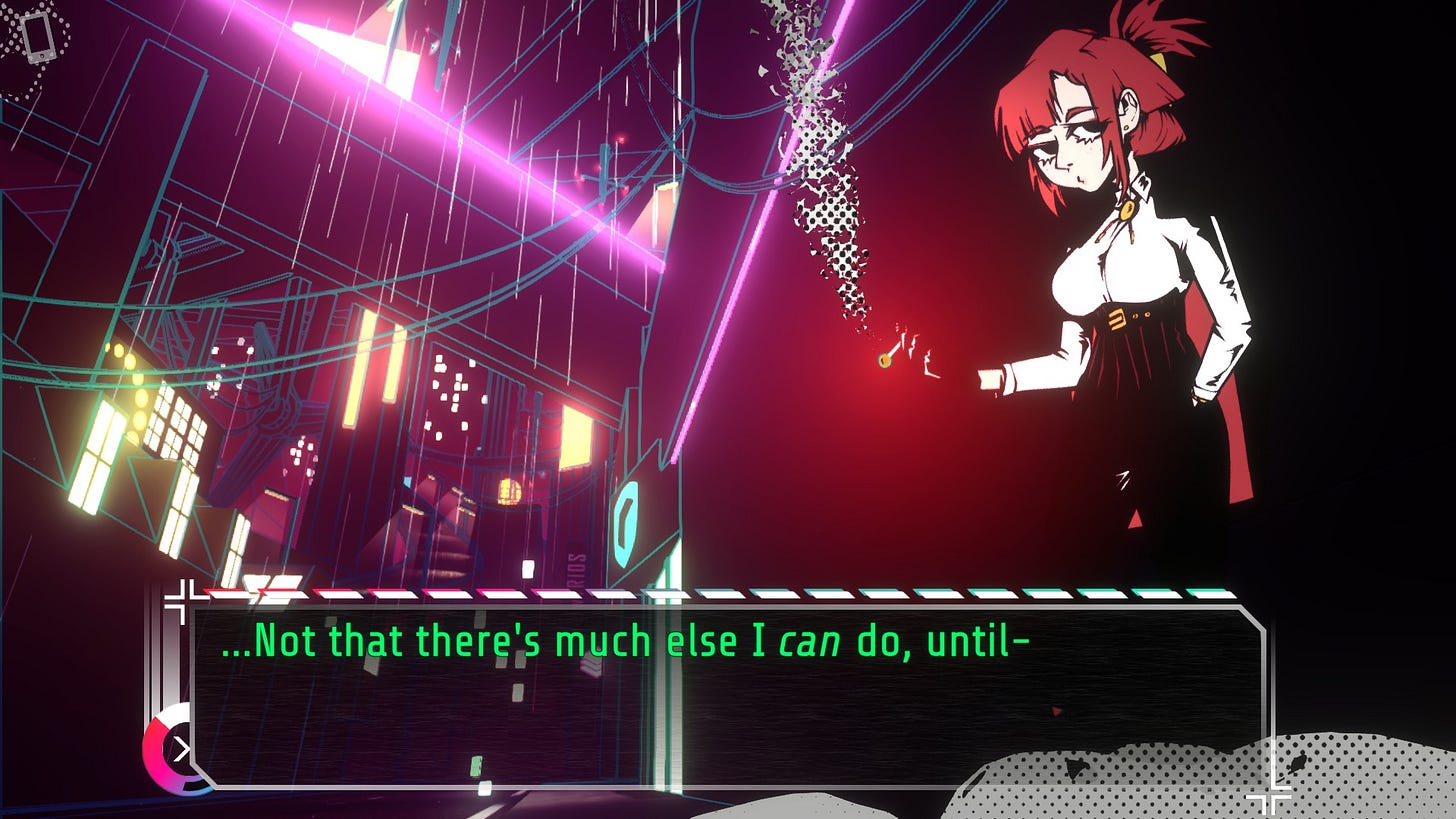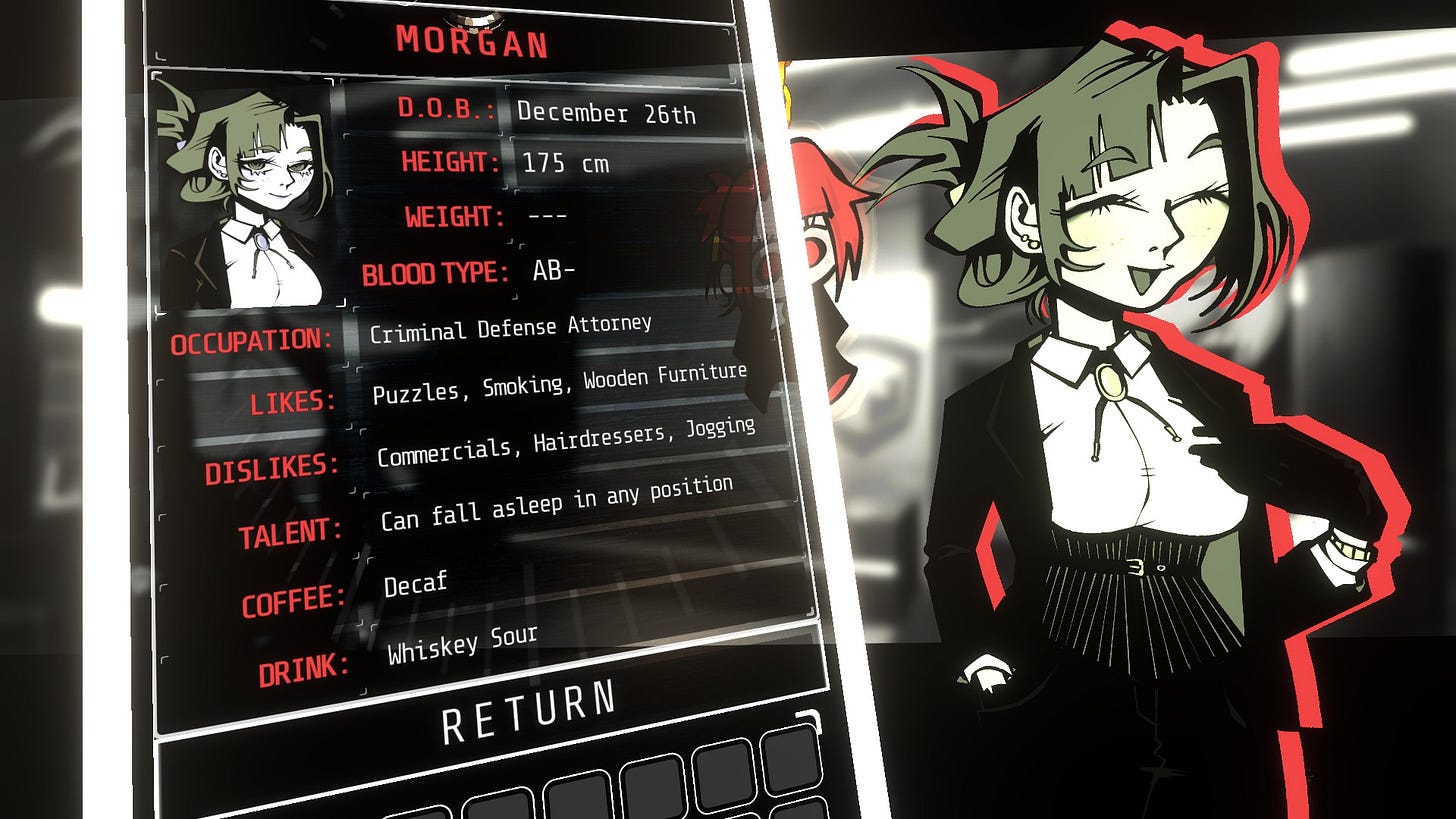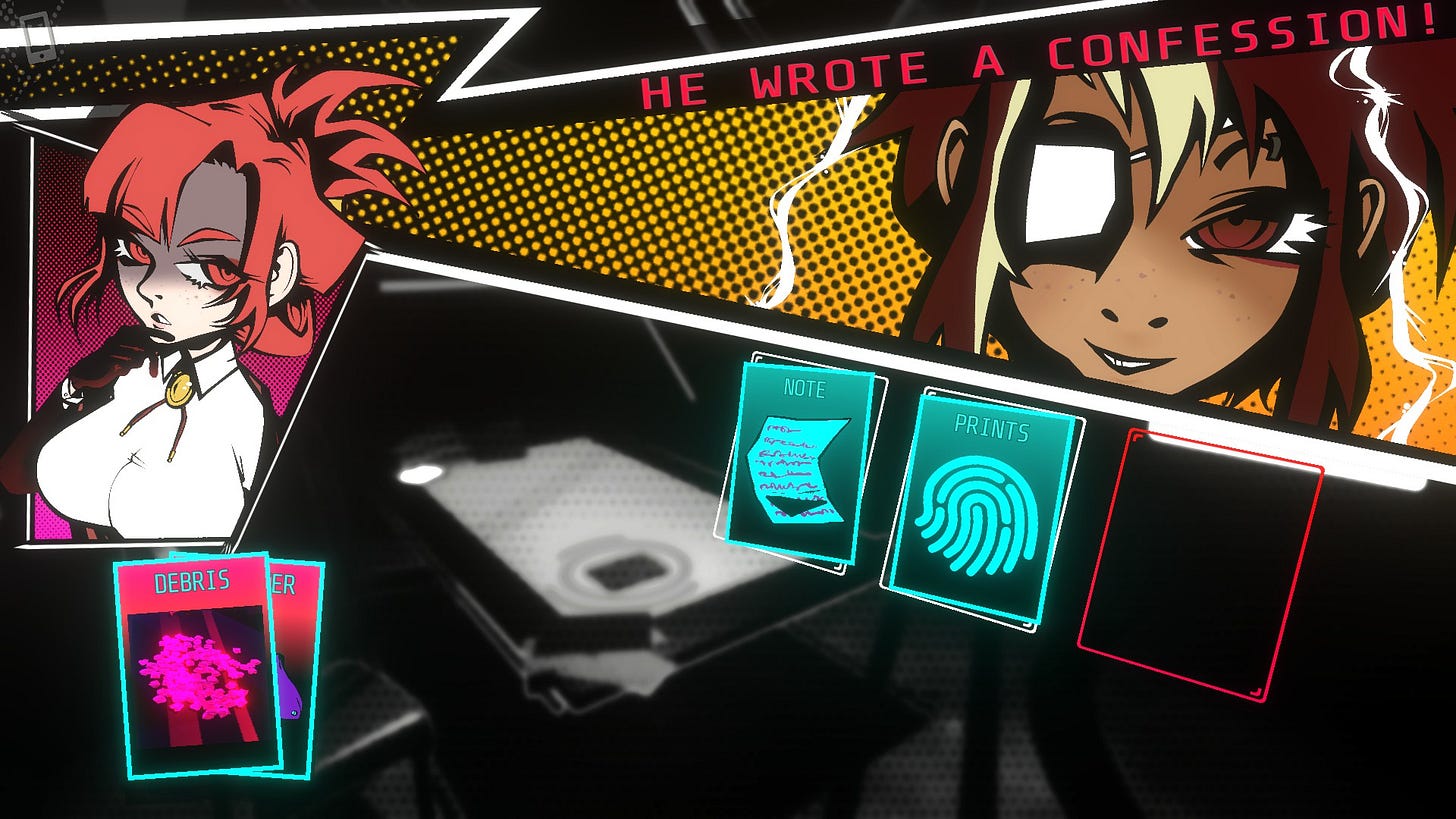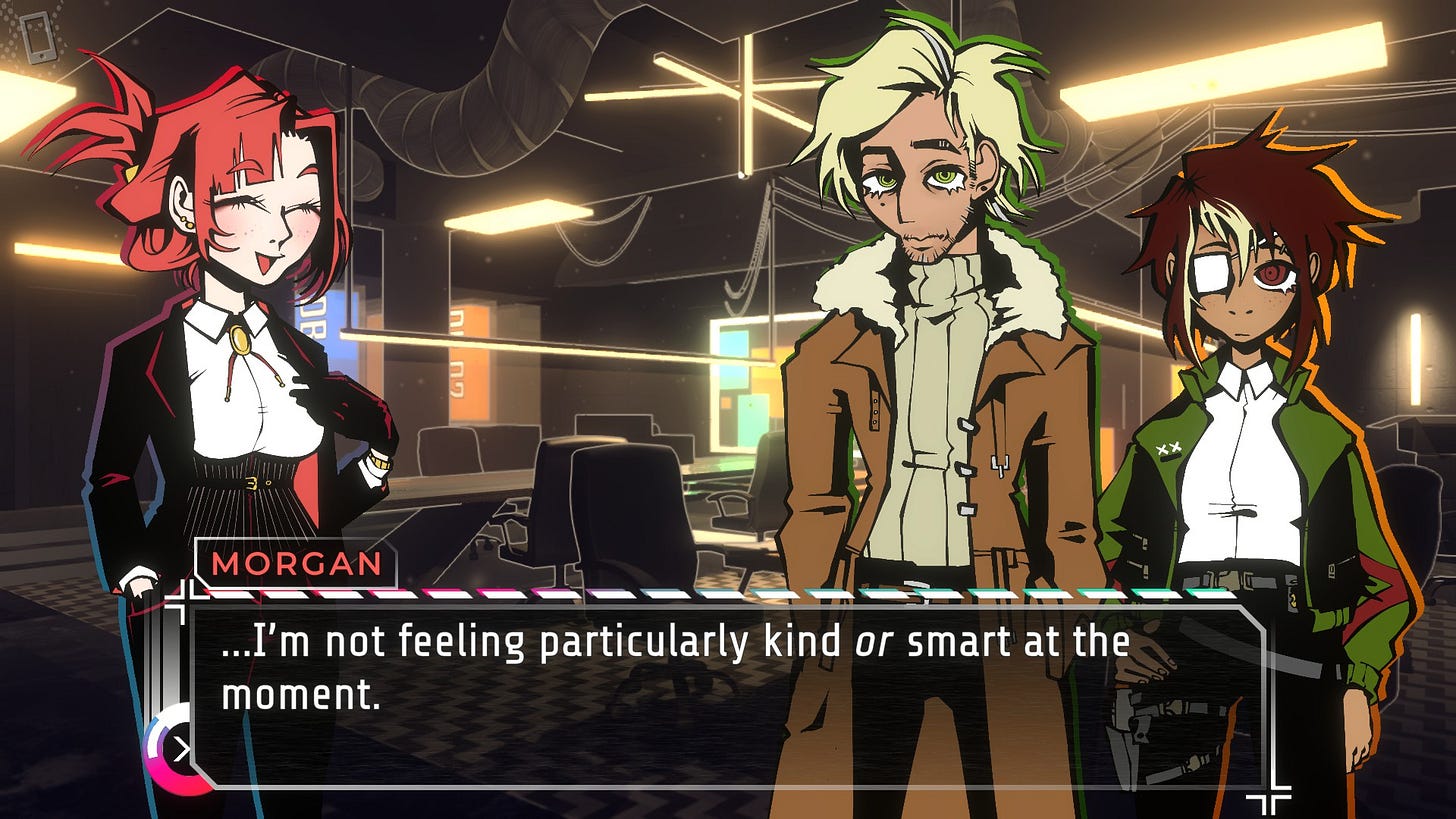Ace Attorney is one of those franchises that makes me wonder if anyone dreamt it would be as successful as it was. A game initially conceived for Gameboy Advance in which you play as a hapless rookie lawyer facing impossible odds, its appeal was, in all likelihood, relatively niche. Nevertheless, it managed to pick up - its niche became a source of strength and carried on the back of a wonderfully written cast, an excellent soundtrack, and occasionally frustrating but quite satisfying logic puzzles, the series grew to have 6-8 main installments (depending on how you count) and several spinoffs. It even inspired many other developers to make their takes on the concept, like the bullet hell mashup Star Apprentice: Magical Murder Mystery, the Death Game thriller series Danganronpa, or the befeathered Aviary Attorney.
With all this time and creative energy, it should come as no surprise that eventually, someone would take the courage to make an Ace Attorney-influenced game and ask themselves a question—our good old friend Phoenix Wright might have been a bumbling rookie, but what if we played a game with a bit more edge to it? A game about playing as an attorney with experience, history, skills, and perhaps a little touch of craftiness and skullduggery?
In the demo for nth Circle Studios’ Of The Devil, we meet Morgan, an attorney in a future Cyberpunk surveillance state where security is so tight that the rate of clearance in crimes and guilty verdicts given approaches 100%. Against such overwhelming odds, only a lawyer with cutting insight, a silver tongue, and a killer Poker Face can guarantee a client’s freedom.
A Comic Book Cinematography
First of all, I should point out that this game is visually stunning despite generally showcasing limited animation. The game is presented with all the gravitas of a typical cyberpunk Neo-Noir, with characters represented as immediately iconic “cutouts” that feel like they were drawn from an anime and manga-inspired 90s western comic, and I mean that as praise. The game uses the 2D cutouts in a three-dimensional space with incredible skill, switching out the camera’s positions and using different perspectives to give otherwise still images a vivacious and immersive feeling in a way that reminds me of the best of Danganronpa’s class trials.
Added to this camera work is a genuinely distinctive visual flair I knew I’d have to talk about ever since I saw the trick with the transparent texture of the smoke from Morgan’s cigarette in the opening. The game plays with its aesthetic presentation with sudden cuts, props entering from off the screen, and other things besides. At its best, it is genuinely cinematic and - rarely occupies less than its best. Added to that effect is the game’s soundtrack, confidently announcing the titles of its tracks as they play. It’s a catchy one, with strong beats and techno sounds, and overall, it perfectly complements the emotions of various scenes, though always with a certain undercurrent of tension. It’s not quite as iconic as the soundtrack from Ace Attorney: Phoenix Wright, for instance, but I probably haven’t seen long enough into the game to get to its equivalent of “Pursuit ~ Cornered.”
The UI is sleek and presented as an image of technological modernity, with most menus portrayed diegetically as the screen of Morgan’s smartphone. In many ways, it’s more convenient than the UI in a game like The Great Ace Attorney because it is easy to pull up and cross-reference information, but I need more time with it to get used to it.
Devil Games of Chance
I write this section knowing full well that I’ve only tried a small slice of the game and that there’s probably more to it, but I’m very impressed with this game as an evolution of the Ace Attorney style. The basic concept around which everything turns is that Morgan sees the entire process as like playing a game of Poker, meaning that in the end, what matters the most is being solvent or, in legal terms, having credit. Credit functions similarly to Ace Attorney’s penalty system, a “health bar” that causes a game to go over after too many mistakes. The difference is that in Ace Attorney, you can only restore your penalties after certain checkpoints, whereas in Of The Devil, credit is a far more fluid concept.
For instance, thoroughly examining all the evidence and surroundings can award credits. When you find specific text files to read, the game will also give you a reading comprehension quiz and award you credit for success. This incentive towards careful analysis not only encourages completion and attention but also prepares you better for the “trial” portion later - in the Ace Attorney games, it would sometimes feel like the investigation phase could be a bit of a drag only sustained by the occasional flash of humor, but the Credit system means that it didn’t drag at all in this case.
I got to experience a fraction of what feels like the “trial” portion of this game, and I’m thoroughly satisfied so far. The characters you argue with construct meaningful chains of logical argumentation based on evidence, and it’s up to you to use that same evidence to point out the flaws in said logic. I did feel like the level of the logic used was pretty complex in some cases, but the game narrows down what evidence or arguments could be relevant, so you won’t run into the Ace Attorney situation where you’re completely clueless and just using all the evidence in order. It wasn’t a cakewalk, but it all made sense.
Even when presenting evidence, the poker theming remains. Getting things wrong will cost you your credit, but you can wager credit if you’re confident in your conclusions and risk it to get more. Similarly, there are several points where you’re asked to “Call” or “Raise” during your argument to determine if a point is worth pursuing - you can escalate your argumentation if you think there’s a chance, but if you’re wrong, it’ll cost you more credit than if you backed down. This fluid quantification of your performance encourages a bit more risk-taking and gives you the tools necessary to win. I loved it despite only getting a taste.
Speak Of
For a demo, Of The Devil’s episode Zero certainly made a strong impression. It felt like playing something like Ace Attorney but improved and retouched on many levels even before we get to the excellently written characters and presentation. It even felt like it was filled with humor and occasional laughs, even though it had a sort of acerbic, cynical edge suitable to the city it inhabits. Furthermore, there are reasons for replay value, as your final amount of Credit unlocks concept art and extras.
The game presents us with an interesting setting: a cyberpunk city straight out of a neo-noir dystopia where personal privacy is undermined by internet cookies on steroids, people struggle under corporate rule but also the oppressive boot of the state, and arguments are deployed to match liberty against security. It is a setting of rainy neon and sleek smartphones, low crime and low life, newspapers with paywalls, and AI bureaucrats. In many ways, it feels like a game with things to say about today's world, and I can’t wait to see what else it has to say.
What I’m Watching —
The Final Gamer is struggling through another playthrough of Shenmue 3, and I enjoy his suffering.
Many thanks to my subscribers, paid or otherwise. Your support continues to make While the Iron is Cold into a weekly publication and sets the stage for future expansion.
I’d be very thankful if you could consider becoming a paid subscriber, but I hope you continue to read, no matter what!







Your writing is getting better with every article it Is really flowing and natural.